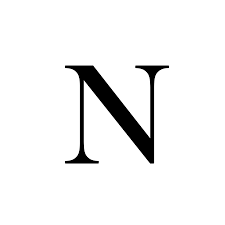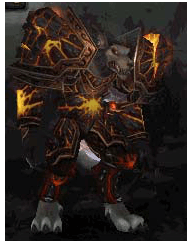Character is a single visual object that is also referred to as char, which is used to represent numbers, symbols, or text. For example, N is a letter and is a single character, which is shown below. One character is equal to one byte in the computer that is 8 bits.

A character is also used to describe a computer player; it plays an important role as a fictitious player in a computer game. For instance, you are considered a character or PC while playing a game. If a character is not controlled by another human, and you encounter that character, it is referred to as a non-player character (NPC). In the World of Warcraft game, the below picture is an example of a game character.

A character is a printable symbol in information technology that have pictographic or phonetic meaning. Usually, it is the part of a word of the text, expressing grammatical punctuation, or depicting a numeral. Today, a character is typically one of a limited number of symbols in information technology, including the numerals in the decimal number system, the letters of a particular language’s alphabet, and some special symbols like atsign (@) and ampersand (&). For characters, there are numerous standards of computer encoding have been developed. ASCII is the most commonly used in personal computers, and IBM mainframe systems use EBCDIC. Furthermore, a Unicode (new standard) is supported by later Windows systems.
Sometimes, a difference is made between glyph and character. At the time of this distinction, in terms of sound and meaning, a character can be differentiated from other characters. A glyph is a graphic image that is used to describe the character. A character can have more than one possible glyph in different implementations, and more than one possible character can be represented by a glyph.
A character is a display unit of information in computer science that is equivalent to one alphabetic symbol or letter. In computer science, a character is not equal to one bit of machine language, rather than individual characters are described with the help of compiled machine language. For characters, a universal system has been developed called ASCII.
The character is also used as a reserved keyword in a programming language where it may be represented in code languages as chr or char. It plays a critical role in computer programming that is a data type that holds one character (letter, number, etc.) of data. A character is a single unit of a character string or text, where the entire string and the individual characters are manipulated with the help of code functions. And, displayed in object-oriented programming by such as drop-down lists and boxes.
Additionally, some languages may use the abbreviation for certain methods used with string values if they do not have char as a data type. For example, JavaScript has methods charCodeAt() and charAt(), which return values related to the calling string. For example, the charAt() method returns a string having a character. When you run the below code, it would alert the value of the character at position 2 in the string “javatpoint” (start from 0 instead of 1).
-
mystring = “javatpoint”;
-
window.alert(mystring.charAt(2));
The above code forwards an alert with “v” as the location of “j” is 0, “a” is at the location 1, and “v” is at position 2.
Character string
A character string is a collection of characters that are often specified by enclosing the characters in a single (‘ ‘) or doubles (” “) quotes. For instance, California would be a name, but if you write this with a single or double quote like California and ” California ” would be character strings. It is represented by bits of code and organized into a single variable. This string variable that holds characters is defined with a specific length, or its length can be identified by a program. In character string, a name stands for some other object as it does not represent anything and differs from a name.
The character strings are marked by specific syntax in many kinds of computer programs, which are set up or dimensioned via several programming commands and often include quotation marks. Then, these are used to house various types of data that describe ASCII characters. By storing a specific value corresponding to a character, a single byte represents one character in many cases. The UTF protocols or Unicode or octet” protocols can be used by different coding conventions to identify bytes as the units of operation.
In a computer program, a character can play multiple roles. For instance, in the load function of a program, a programmer can create an unpopulated character string with a command. A user event can input data into an unpopulated character string. When the user types a word or any string like “How are you,” then the program can later read that character string and display it on the screen, print it, reserve it for storage, and more. Furthermore, character strings are often included in data storage and data capture functions, which take in names or other types of information.
Variable Character Field (Varchar)
The varchar (variable character field) is a data type that is used to hold values in programming or database languages. It can have any kind of data, such as characters, numeric, punctuation, or spaces. The data type is able to store values up to its maximum size, depending on the database. Mainly, variable character fields are used to string operations and act as temporary variables. A varchar field is usually initialized with the current length equal to zero, and it has a declared maximum length. Its current length can be from zero to the maximum declared field length. According to the programming language used, the method of declaring a variable character field is different.
The variable character field includes the biggest advantage of the avoidance of padding. In the case of a character field, regardless of the real size of the string, the field occupies the exact number of characters, and the difference between the field length and fixed length is expanded with spaces. In the variable character field, only the minimum storage space is required as it uses the space needed for the size of the string, unlike a character field. It also helps in sorting and searching for values as it includes a feature to avoid any wastage.
Additionally, in some databases and programming languages, if any extra space is found, it removes automatically before storing it to the database. There could be limitations on a variable character field on the basis of the database or the programming language; it cannot be used as a candidate or primary key or cannot be used with a select statement. The variable character field is supported by most relational database management systems.